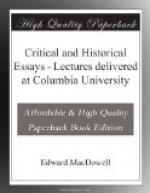Gluck’s victory over the Piccinists gave to the French form of Italian opera an impetus that caused Cherubini to proceed on almost the same lines in his operas, the “Water Carrier,” etc. Cherubini was a pupil of Andreas Sarti, a celebrated contrapuntist and a disciple of the last of the Italian church composers who looked back to Palestrina for inspiration. Thus the infusion of a certain soberness of diction, which we call German, fitted in with the man’s training and predilections.
The first names we meet with in French opera after Cherubini are those of Gretry, Mehul, and Spontini. The former was a Frenchman whose works are now obsolete, although Macfarren, in the “Encyclopedia Brittanica,” says that he is the only French composer of symphonies that are known and enjoy popularity in France.
Gretry was born in Liege, about 1740. He walked to Italy, studied in Rome, and returned to France about 1770. None of his works have come down to us, but his name is interesting by reason of a certain contradiction in his operas. This contradiction consists in his being one of the first to revive the idea of the hidden orchestra; it is interesting also to note that in his “Richard Coeur de Lion,” he anticipated Wagner’s use of the leitmotiv. His words on the hidden orchestra sound strangely modern:
PLAN FOR A NEW THEATRE.—I should like the auditorium of my theatre to be small, holding at the most one thousand persons and consisting of a sort of open space, without boxes, small or great; for these nooks only encourage talking and scandal. I would like the orchestra to be concealed, so that neither the musicians nor the lights on their music stands could be visible to the spectators.
Mehul was born about 1763 in the south of France, and is celebrated, among other things, as being a pupil of Gluck, in Paris. He was also noted for having, at the request of Napoleon, brought out an opera based on Macpherson’s “Ossian,” in which no violins were used in the orchestra. “Joseph,” another opera of his, is occasionally given in small German towns. Mehul died in 1817.
Spontini, the next representative of opera in France, was an Italian, born in 1774. He went to Paris in 1803, where, through the influence of the Empress Josephine, he was enabled to have several small operas performed; finally in 1807 his “Vestal,” written to a French text, was given with great success. In this, his greatest work, he followed Gluck’s footsteps, not only in the music, but also in the choice of a classic subject. In 1809, he branched out into a more romantic vein with the opera of “Fernando Cortez.” His other works never attained popularity. After the Restoration in France, he was named director of the court music in Berlin by the King of Prussia, at an annual salary of ten thousand thalers (about $7,500), a position he held from 1820 to 1840. He died in Italy in 1851. Spontini may be said to have been the last representative of the Gluck opera; but he also brought into it all the magnificence in scenery, etc., that would naturally be expected by the fashion of the First Empire. He made no innovations, and merely served to keep alive the traditions of Grand Opera in France.




